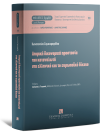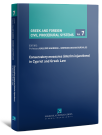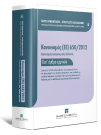N. Andrews/Ε. Αμπατζής/Ε. Ασημακοπούλου..., Issues of Estoppel and Res Judicata in Ango-American and Greek Law, 2014

In the last years, civil procedural law has been in the course of constant change.
Such considerations have in principle incited us to organize international workshops on comparative analysis of Greek and foreign civil procedural laws in a systematic way at the Aristotle University of Thessaloniki. The contributions to such workshops have helped highlighting the similarities and differences between the compared jurisdictions and appreciating institutions functioning effectively. The benefits of those workshops would certainly be multiple, if their minutes were published in a series. Researchers, practicing lawyers and students will, thus, have the opportunity to refer to the relevant papers, in order to obtain an overview of different institutions and their functioning in various jurisdictions and keep the channels of communication with the international community open.
The first conference, which also coincides with the beginning of the series, took place in May 2012 and dealt with “Issues of Estoppel and Res judicata in Anglo-American and Greek Law”.
Our aim is to turn this endeavour into an incentive for a sustained and in-depth comparative research between civil procedural laws of various states and the Greek one, which constitutes, by the way, a law with a long history and rich theoretical and jurisprudential output. Through such a comparison, legal thought should get grafted with innovative concepts, escape from the well known and well established and develop a new dynamic potential. The more widespread and systematic the exchange of information and views at international level is, the more national systems will be revitalized and will work better for the benefit of their citizens. Our hope and prayer is that this series will contribute to a creative comparative research.
Edition info
Table of contents +-
Series Editors’ ForewOrd.
PREFACE.
TABLE OF CONTENTS.
LIST OF ABBREVIATIONS.
PROLOGUE: The varieties of estoppel (by Prof. G. Diamantopoulos)
Ι. Introduction: venire contra factum proprium and estoppel. Two legal doctrines, one idea
II. Estoppel: the varieties
1. Estoppel by record (or estoppel per rem judicatam)
2. Estoppel by deed
3. Estoppel by conduct (or estoppel in pais)
III. Addendum
Res judicata and finality: Estoppel in the context of judicial decisions and arbitration awards (by Prof. N. Andrews)
Introduction
I. Recognition of finality as a hallowed procedural principle
II. The link between finality and effectiveness in court proceedings
III. Cause of action estoppel following a judicial decision
IV. Cause of action estoppel and consent judgments
V. Issue estoppel
VI. Preclusion of points that should have been raised in earlier proceedings: The rule in Henderson v. Henderson (1843)
VII. A and B’s action succeeded by an action between A and C: The outer rim of the rule in Henderson v. Henderson (1843)
VIII. Res judicata in the context of multi-party litigation
IX. Other aspects of finality
X. Finality and res judicata in the context of arbitral awards: the general regime. English practice
XI. Disputed arbitration clauses: finality issues arising from the European Court of Justice’s prohibition upon anti-suit injunctions
XII. Concluding summary
Principles of preclusion and res judicata: Reflections from the perspectives of Greek and American law (by Prof. K. Makridou)
I. Introduction
II. Objective and justification of estoppel per rem judicatam
III. A valid judgment is entitled to res judicata effect
IV. The requirement of a final judgment
V. Adjudication on the merits of an action
VI. Claim preclusion - Issue preclusion
VII. Application of issue preclusion to default judgments
VIII. Application of claim and issue preclusion to consent judgments
Estoppel in english contract law (by Dr. M.-G. Dracos)
I. Introduction
II. The key idea behind estoppels
III. The functions of estoppels
IV. Estoppel and its application to factual propositions
V. Assumptions of law
VI. Rights in Property
VII. Restraining the unconscionable exercise of rights
VIII. Conclusion
Judicial estoppel: Contradictory procedural behaviour in Greek and American law (by Prof. G. Diamantopoulos)
I. Introduction
II. Forms of contradictory procedural behavior: genuine and nothus
III. Range of prohibition
1. Assertions of the parties
2. Applications (requests) of the parties
IV. Field of genuine contradictory procedural behavior
1. Contradictory procedural behavior within the same trial
2. Contradictory procedural behavior in successive proceedings
V. Legal consequences of inconsistent positions
1. Procedural sanctions
A. Inadmissibility of inconsistent factual allegations
B. Separation of inconsistent requests
2. Ways of avoiding sanctions
VI. Procedural treatment of inconsistent positions
1. Spontaneous consideration of the prohibition
2. Time of submission of the exceptio venire contra factum proprium and cassation review of its prerequisites
VII. Conclusions
COMMENTS
A. The Collateral Estoppel Effect of Criminal Convictions in Subsequent Civil Trials. A Comparative Glance at the Different Approaches in American and in Greek Law (by E. Abatzis)
B. Res judicata effect of foreign judgements in cases of transnational insolvency (Reg. 1346/2000) (by E. Asimakopoulou)
C. Abuse of property rights in Greek Law compared with the doctrine of estoppel in English-American Law (by A. Papaspyropoulos)
D. Issues of Estoppel and Res judicata on class action judgments in Greek and American law (by A. Plevri)
E. Recovery for future injury and the rule against splitting causes of action (by A. Vezyrtzi)
Conclusions (by Prof. K. Makridou).





















